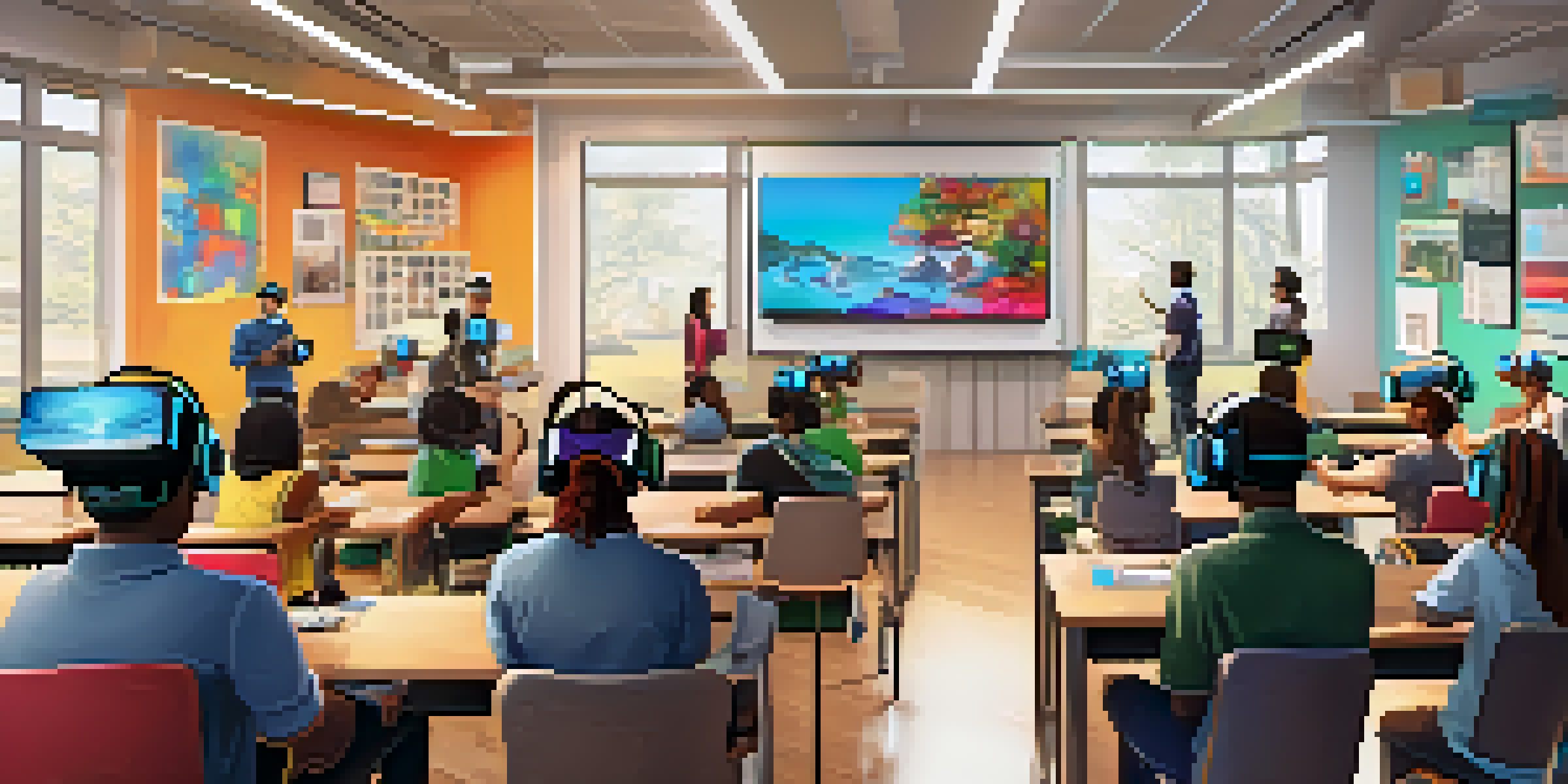The Significance of VR in Teaching Ethics in Business Education

Understanding Ethics in Business Education
Ethics in business education is crucial for preparing future leaders. It involves teaching students about moral principles that guide their decisions in a corporate environment. Without a solid understanding of ethics, students may struggle to navigate complex business situations effectively.
Ethics is knowing the difference between what you have a right to do and what is right to do.
By incorporating ethical considerations into the curriculum, educators aim to cultivate a sense of responsibility among students. This responsibility extends beyond just profit-making, emphasizing the importance of integrity and social responsibility. As business landscapes evolve, so does the need for ethical frameworks that can adapt to new challenges.
Ultimately, a strong foundation in ethics empowers students to make informed choices that benefit not only their companies but also society as a whole. This holistic approach to education prepares them to become ethical leaders in their respective fields.
The Emergence of Virtual Reality in Education
Virtual Reality (VR) has emerged as a powerful tool in various educational fields, offering immersive learning experiences. By providing a simulated environment, VR allows students to engage with complex concepts in a hands-on manner. This technology has the potential to revolutionize how ethics is taught in business education.

Unlike traditional teaching methods, VR immerses students in realistic scenarios that require ethical decision-making. For example, students can navigate a virtual corporate crisis, weighing the consequences of their choices in real-time. This engagement fosters deeper understanding and retention of ethical principles.
Ethics Education Shapes Future Leaders
A strong foundation in ethics prepares students to navigate complex business situations with integrity and social responsibility.
Moreover, VR can create a safe space for students to explore ethical dilemmas without the fear of real-world repercussions. This freedom to experiment with different outcomes enhances their critical thinking and problem-solving skills.
How VR Enhances Ethical Decision-Making Skills
One of the standout benefits of VR in teaching ethics is its ability to simulate high-stakes situations. Students can experience the pressures of a business environment where they must make tough ethical choices. This simulation not only tests their knowledge but also sharpens their decision-making skills.
The greatest danger in times of turbulence is not the turbulence; it is to act with yesterday's logic.
For instance, in a VR scenario, students might face a dilemma involving corporate fraud. They would need to analyze the situation, consult with virtual stakeholders, and weigh the implications of their actions. Such immersive experiences encourage students to think critically and act thoughtfully.
Additionally, these simulations can be tailored to reflect real-world issues relevant to the students' industry interests. This personalized approach makes the learning experience more engaging and directly applicable to their future careers.
Real-World Applications of VR in Business Ethics
Many universities and organizations are already implementing VR technology to teach business ethics. For instance, some business schools have developed VR modules that allow students to step into the shoes of corporate leaders facing ethical dilemmas. These programs offer a unique blend of theory and practice.
Moreover, companies are using VR for employee training, helping staff navigate ethical challenges in a controlled environment. This application not only improves individual decision-making but also fosters a culture of ethical awareness within organizations. The benefits extend beyond the classroom into the workplace.
VR Enhances Ethical Decision-Making
Virtual Reality immerses students in realistic scenarios, enabling them to practice ethical decision-making in a safe environment.
As VR technology continues to evolve, its integration into business education is likely to expand, providing even more opportunities for immersive learning experiences. This shift could ultimately lead to a generation of business leaders who prioritize ethics in their decision-making.
Student Engagement and Motivation Through VR
Engagement is a key factor in effective learning, and VR has proven to captivate students' attention like no other tool. The novelty of VR technology can spark interest in subjects that might otherwise seem dry or complex. This heightened engagement can lead to a more profound exploration of ethical issues.
Additionally, VR encourages active participation, which is essential for retaining knowledge. Students are not just passive recipients of information; they are active participants in their learning journeys. This shift from traditional lectures to immersive experiences can significantly enhance their motivation to learn about ethics.
As students work through ethical scenarios in VR, they become more invested in the outcomes. This emotional connection can lead to a deeper understanding of ethical principles and their implications, making them more likely to apply these lessons in real-life situations.
The Role of Empathy in Ethical Education
Empathy plays a crucial role in ethical decision-making, and VR can effectively cultivate this quality in students. By putting students in the shoes of others, VR allows them to experience different perspectives and understand the emotional impact of their decisions. This kind of experiential learning is invaluable in developing ethical leaders.
For example, a VR scenario might explore the consequences of a business decision on various stakeholders, such as employees, customers, and the community. Experiencing these perspectives firsthand can inspire students to consider the broader implications of their actions.
Empathy Cultivated Through VR Learning
VR experiences allow students to understand various perspectives, fostering empathy and better ethical choices in business.
As students learn to empathize with different viewpoints, they become more adept at making ethical choices that take into account the well-being of all parties involved. This emphasis on empathy not only benefits individual students but also contributes to a more compassionate business environment overall.
Challenges and Considerations in Implementing VR
While the benefits of VR in teaching ethics are promising, there are challenges to consider. The cost of VR technology can be a barrier for some educational institutions, limiting access to those who could benefit most from it. Additionally, the development of high-quality VR content requires time and expertise, which can strain resources.
Moreover, educators need to ensure that VR experiences are designed thoughtfully to avoid trivializing serious ethical issues. It’s essential to create scenarios that encourage deep reflection rather than merely entertaining students. Careful planning and execution can help mitigate these challenges.

As technology advances and becomes more accessible, the potential for VR in business education will likely grow. By addressing these challenges proactively, institutions can leverage VR to foster a new generation of ethical leaders.